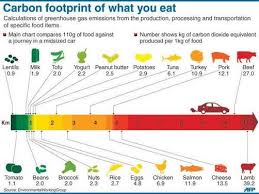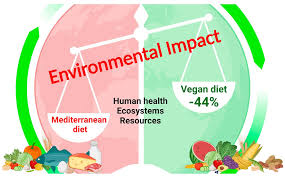
Environmental Impact
The environmental impact of dietary choices has become an increasingly important topic in global discussions about sustainability, climate change, and resource conservation. Shifting towards plant-based diets, such as vegetarianism, offers significant potential to reduce the strain on the planet’s ecosystems. Research has shown that producing and eating meat causes a lot of greenhouse gases, cuts down forests, uses lots of water, and harms plants and animals (Lentz et al., 2018; Vellinga et al., 2022). As awareness of these impacts grows, more individuals and policymakers are recognizing that what we eat is not just a personal choice but one that carries far-reaching environmental consequences.

One of the most pressing environmental concerns associated with meat consumption is its contribution to climate change. Raising animals for food is a major cause of greenhouse gases around the world, with methane and nitrous oxide being much more powerful than carbon dioxide in causing global warming (Lentz et al., 2018). Studies estimate that meat production is responsible for up to 14.5% of global emissions, surpassing even the emissions generated by the entire transportation sector (Lentz et al., 2018). Choosing vegetarian options can therefore play a meaningful role in reducing an individual’s carbon footprint and slowing the pace of climate change.
In addition to greenhouse gases, raising animals for food is a major cause of deforestation, especially in places like the Amazon rainforest. Big areas of forest are cut down to make space for grazing cattle or growing feed like soy, which is then used to fatten livestock (Lentz et al., 2018). This destruction of forests not only eliminates vital carbon sinks that absorb carbon dioxide from the atmosphere but also leads to habitat loss for countless plant and animal species, pushing many toward extinction. By choosing vegetarian diets that rely less on these resource-intensive systems, individuals can help reduce the demand for land conversion and support the preservation of critical ecosystems.
Water use is another significant environmental factor. Producing meat, especially beef, uses a lot of water for animals to drink, clean, and grow their feed. It takes about 15,000 liters of water to make one kilogram of beef, while grains or vegetables need only around 1,500 liters (Lentz et al., 2018). This disparity becomes even more concerning in regions where water scarcity is already a major issue. Choosing a vegetarian diet helps reduce pressure on freshwater resources, making it a more sustainable option in a world where access to clean water is becoming increasingly limited.

Beyond the direct environmental impacts of meat production, there are also significant indirect consequences. Animal agriculture contributes to pollution through runoff from manure and fertilizers, which can contaminate waterways, leading to eutrophication and the creation of "dead zones" in oceans and lakes (Vellinga et al., 2022). These zones, deprived of oxygen, can no longer support marine life, resulting in the collapse of aquatic ecosystems. The widespread use of antibiotics in livestock farming further contributes to antibiotic resistance, posing a serious risk to human health and the environment. By reducing or eliminating meat from their diets, individuals can help mitigate these harmful effects and promote a healthier, more resilient planet.
Despite the clear environmental benefits of reducing meat consumption, many people remain unaware of the connection between their food choices and the state of the planet. Lentz et al. (2018) highlight that environmental concerns are often a weaker motivator for dietary change compared to personal health or economic factors. However, studies like the one by Vellinga et al. (2022) demonstrate that raising awareness through information campaigns or policy measures—such as meat taxes and informational nudges—can influence consumer behavior. In their study, a mix of higher meat prices and information about the environment led to a big drop in meat buying in a simulated shopping environment. This suggests that while individual dietary choices are important, broader systemic changes and public education efforts are also essential in creating lasting shifts toward more sustainable eating patterns.
Adopting a vegetarian diet is not only a personal step toward sustainability but also part of a larger movement to address global environmental challenges. As Vellinga et al. (2022) note, reducing meat consumption at a population level could make a big difference in cutting greenhouse gas emissions and other environmental pressures. Even modest shifts, such as changing a few meat meals to plant-based ones each week, can have a cumulative positive impact when embraced by large numbers of people. Furthermore, reducing meat consumption can also help ensure more equitable access to food resources. Livestock farming is an inefficient way to produce calories, as much of the energy from feed is lost during conversion to animal protein. By consuming plants directly, more food can be produced with fewer inputs, helping to feed a growing global population without further degrading the environment (Lentz et al., 2018).
The environmental argument for vegetarianism is compelling: choosing a plant-based diet lowers greenhouse gases and saves water and land, prevents deforestation, and helps protect biodiversity. It is a practical, everyday action that individuals can take to contribute to a healthier planet. As more people become aware of the link between diet and environmental sustainability, the movement toward vegetarianism and other plant-forward diets has the potential to create meaningful change. While no single choice can solve the complex challenges of climate change and environmental degradation, dietary shifts—especially when supported by policy changes and public awareness—are a critical piece of the solution.
On This Page
- Environmental impact of dietary choices
- Meat consumption and greenhouse gases
- Deforestation and habitat loss
- Water usage in meat production
- Pollution and ecosystem damage
